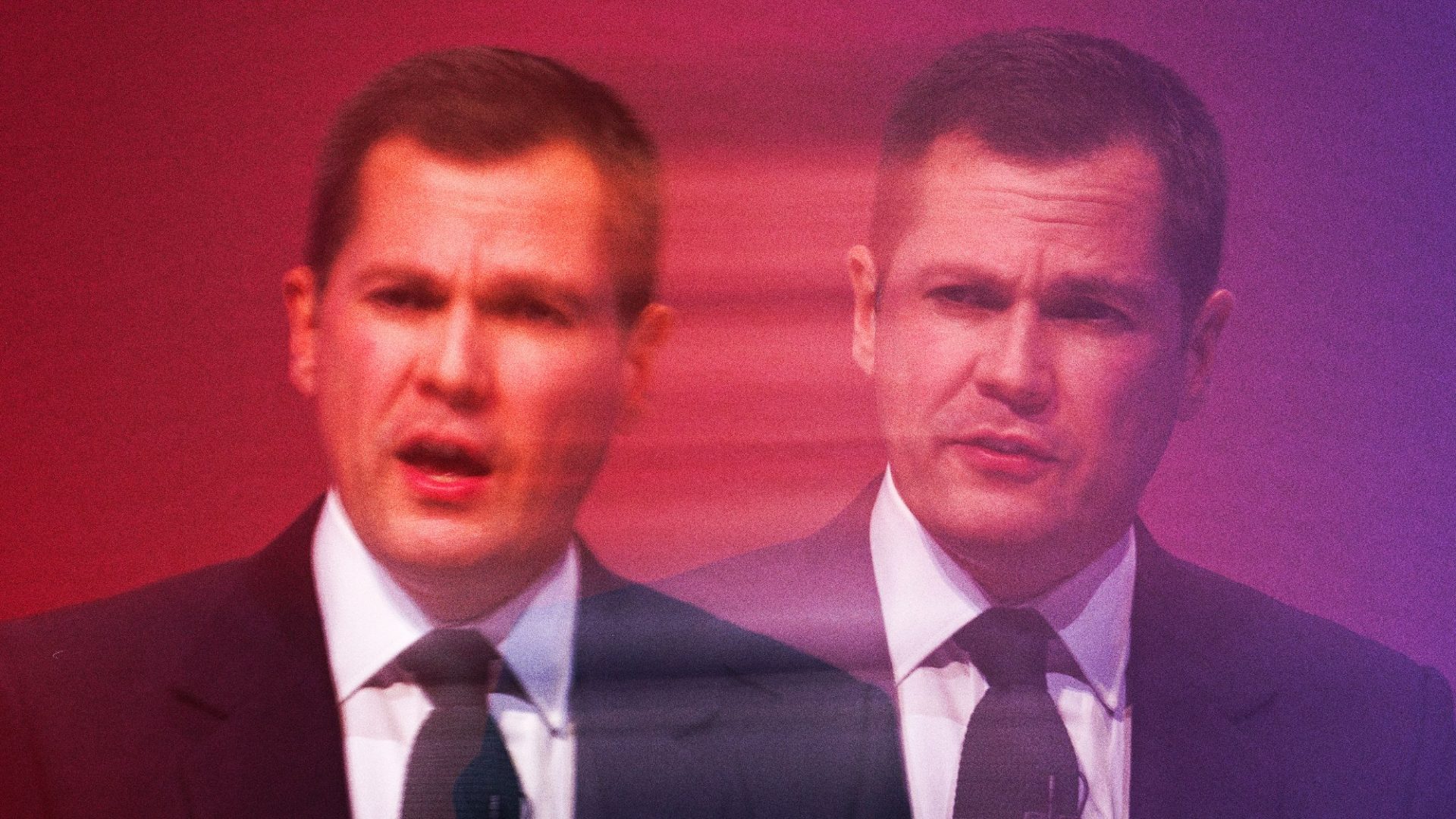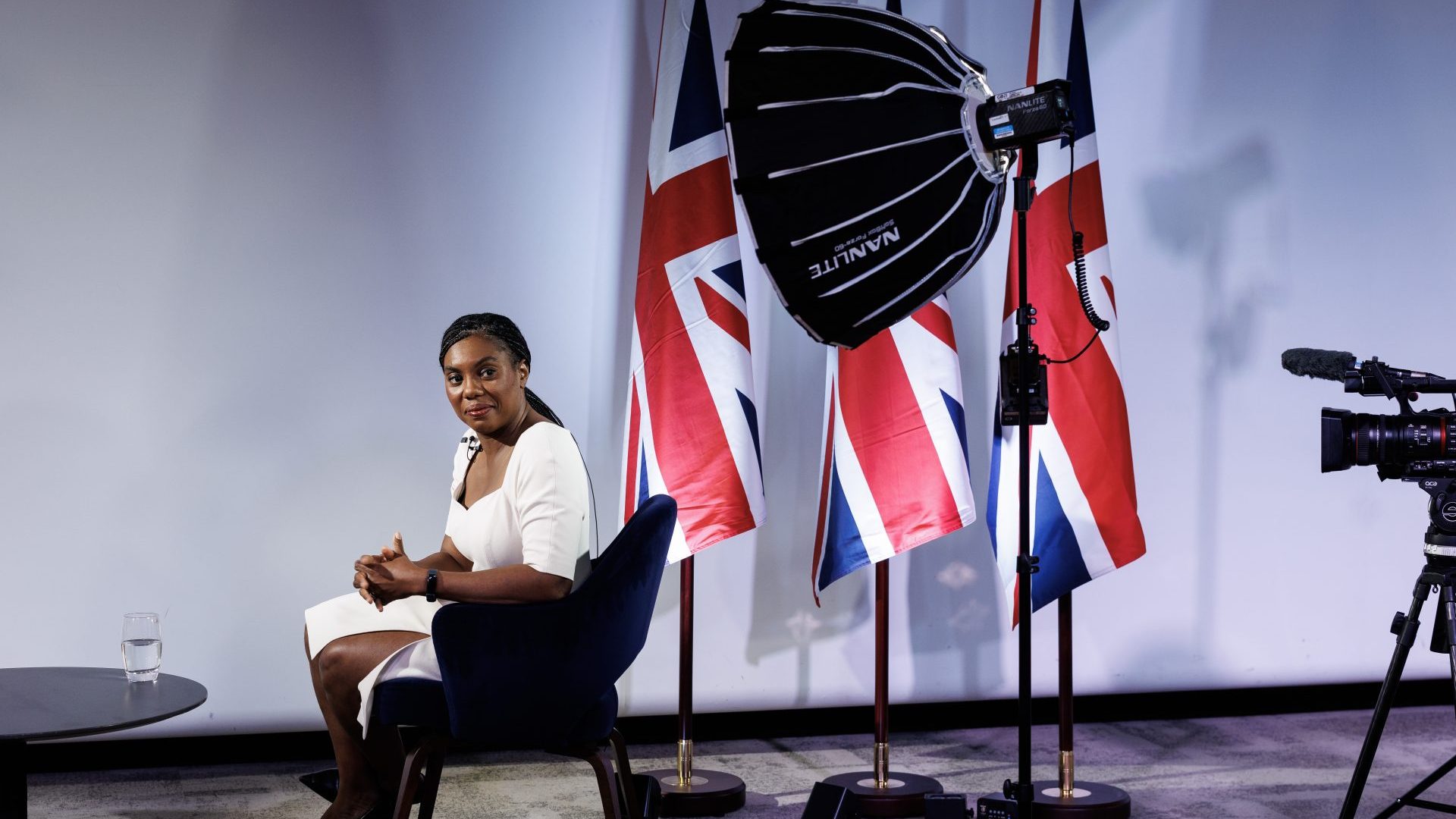This article was originally published October 1, 2025
Paul the Apostle had his Damascene conversion and Robert Jenrick had his time at the Home Office. That’s how the story goes. The former secretary of state resigned from the government at the end of 2023 and, since last year’s election has become the most unavoidable Tory in Britain – much more talkative, more visible than the woman who beat him to become leader, Kemi Badenoch.
Jenrick, once viewed as a moderate, has also become very, very right wing, and is now trying to drag his party even further down that road with him. No one really saw any of it coming.
That’s why they focus on his stint as immigration minister. Something had to have happened, right? People don’t just change for no reason, and everyone loves a clear narrative. Look closer, however, and you will find that the answer is a bit more complicated than that. Keep going, and you’ll wonder if that even was the right question to ask – but let’s not skip ahead.
Jenrick was elected in 2014 and he seemed pudgy, smiley, and unremarkable. A journalist who covered his by-election win in Newark called him “reassuringly dull”. He blended into the background after that.
In early 2015, he was appointed as parliamentary private secretary to Esther McVey at the Department for Work and Pensions. Later that year, he became PPS to Michael Gove, who was justice secretary. A year after that, Liz Truss replaced Gove and Jenrick kept his job.
In 2017, Theresa May won a snap general election and everything changed. Well, most things did. Jenrick was appointed as PPS to Amber Rudd, then home secretary.
The job, which is unpaid, sits between the frontbench and the backbench. It’s a useful stepping stone for ambitious MPs, and it will teach you a lot, but no one wants to languish at that level, forever stuck in limbo. Jenrick spent three years there.
Eventually he became exchequer secretary to the Treasury, but really it all changed in 2019, with an op-ed in the Times. Not enough of a heavy hitter to command a byline by himself, Jenrick teamed up with Oliver Dowden and Rishi Sunak to claim that the Conservatives were “in deep peril. Only Boris Johnson can save us”. All three were offered cabinet jobs a month later.
After years spent languishing as a bag carrier, Jenrick ended up hopping into cabinet before even turning 40. Of course, you could be cynical about the way in which he managed to become housing secretary, having leveraged his status as a Tory moderate to propel a hard Brexiteer into power, but that would mean hating the player, while ignoring the game.
In any case, he ended up getting shuffled out of government in 2021, having spent a lot of those two years hanging around the bottom of ConservativeHome’s monthly cabinet league table. Popular with party members, he was not. After an unremarkable stint back as a minister in the Liz Truss weeks, at the end of 2022 he was appointed as immigration minister by his old friend and colleague Rishi Sunak. The move surprised some, as Jenrick was seen as a close ally of the prime minister, something his new boss Suella Braverman wasn’t.
Still, a consensus was quickly reached in Westminster: conscious of needing a unity cabinet, Sunak had gone for a right wing home secretary while knowing she would probably fail within months. By appointing a friend as her obvious replacement in the department, he would be able to promote Jenrick quite swiftly, while managing to look like he’d offered an olive branch to the headbangers.
In the end, that isn’t quite what happened. Braverman was indeed sacked just over a year later, but Sunak chose to replace her with James Cleverly instead. This happened in November 2023. Paul saw the risen Christ on the road to Damascus, and Jenrick resigned in December 2023, hitting out against a government which he felt wasn’t hardline enough on immigration. Now, for the million-dollar question: what happened there?
“Home Office” was the initial two-word answer of a former special adviser to Sunak. “It changes you. No one I know has ever got more liberal after a stint at the Home Office”. That is the most popular theory in SW1. Jenrick came, saw, and just couldn’t look away. A one-time Cameron wet, he simply had to embrace more stringently hard-right beliefs, and the rest is history. Is it?
“I don’t understand why the immigration brief would radicalise you”, said a former adviser to a Conservative home secretary. “On the crime brief, you absolutely see appalling things – when you see things happening online, and the real world consequences that come from that, that can be quite radicalising,” she said.
“How is that applicable on the immigration brief? A lot of what you’re doing there is thinking about the skills shortages that need to be covered, how you’re helping refugees who helped the British army in Afghanistan, how you’re protecting people who are living under the yoke of communist China in Hong Kong.”
Asked directly if she felt her time at the department had meaningfully changed her views or political positions, her answer was a resounding “no”. Instead, her belief is that “quite often on the right, political expediency creates your outlook on immigration policy”. Westminster has its own version of the story; this is another. It’s shared by several people who were there around then.
“The thing to bear in mind about Rob is that he’s a creation of Rishi’s incompetence,” said one former Conservative minister. “He was promised a cabinet job, or thought he was, and then was made immigration minister to Suella, apparently as a stepping stone. Then there was a reshuffle and he didn’t go up that one rung. At that point all the loyalty that stems from ambition evaporated. It both meant that he felt the freedom to say what he thought would work, and that he didn’t need to bite his tongue.”
Is this the real Jenrick story, then? We’ll probably never know. Only he could tell us, and it’s in his interest to pick one theory over another. It makes him look better; more righteous.
Crucially: should we care? Much has been made about his transformation into someone whose views seem to be very tightly aligned with those of Nigel Farage because there is so little to say about him in general. Nothing in his background stands out. None of his interventions in the Commons are worth mentioning. None of the pieces published about him before 2023 deserve a second airing.
That’s where the one question worth asking is hiding, namely: if the shadow justice secretary really is so uninteresting, then why are we all talking about him? According to Tim Bale, a politics professor at Queen Mary University and astute analyst of Tory politics, Jenrick is both “a culmination and an aberration”, turning him into a compelling character. “In some senses, he’s the tip of the spear, as far as the transformation of the Conservative Party into a radical, populist right wing party is concerned,” Bale said. “He’s very much part of that trend, and in some sense he’s now driving that trend, but it’s a trend that’s been going on for some time.”
On the other hand, “I can’t think of a Tory politician, apart from maybe Norman Tebbit, who has gone so far in saying what he says in the way that he says it. Most Conservative politicians, so far, may have thought some of that stuff and may know that some of their members and their voters think that way, but there’d always been some constraints on them. He seems to have broken free of those constraints.”
That tension may well be the most interesting thing about him, and the context he inhabits. Churchill once famously said, about the House of Commons, that “we shape our buildings, thereafter they shape us”. How fitting it is, then, that an increasingly noxious and self-indulgent party got to mould an otherwise empty suit, and filled him with such cynical rage that he now gets to reshape that very same party in return.
Devoid of any innate beliefs, Jenrick did and thought as he was told, and slid further and further to the right as his environment demanded that he did so. Now stripped of hope and principles, the Conservative Party follows his lead, not with any great enthusiasm but because no one else can be bothered to guide it.
That last part is crucial, by the way. You can wonder what happened at the Home Office and you can dig into the details of his weight loss and his haircut but, as in soapy romcoms, it’s often the one who tries who gets the girl. One former MP who could hardly be described as a Jenrick supporter talked, for example, about the fact that he would often drive around the country to speak at various Conservative associations, even if that meant getting back home in the middle of the night.
The same could not be said of Badenoch. It still cannot. Though technically leader of the opposition, she is rarely spotted and, when she is, often fails to sound like she either knows what she’s talking about, or what she actually wants to talk about. Allegedly she is plotting a Tory comeback but, to most, she simply seems lazy. A lot of them have seemed lazy over the past few years.
Sunak probably didn’t call the election early because he couldn’t be bothered any more, but it still felt that way. Truss didn’t see the point in learning how to do her job, and still seems to believe she shouldn’t have had to. Johnson was born believing he ought to be world king, and he did as he wished from that point on.
Only a year ago, at the party’s annual conference, while the leadership contest was unfolding, many Tory MPs privately said that they could countenance Badenoch, Cleverly or Tugendhat but would really struggle with Jenrick. How many of them now see it as inevitable that he will become their leader within the next year? How many of them have spoken up, or lifted even a finger to ensure it doesn’t happen?
Understanding Robert Jenrick means understanding that it’s not really about him. “Reform is a symptom, not the cause”, he told the Telegraph over the summer, in yet another interview about his increasingly caustic views on immigration. He was right, of course, but it was quite a bleakly amusing thing for him to point out, seeing as the same thing can be said about him.
Not that any of it really matters. Already, the consensus seems to be that he will challenge Badenoch next year, and he will win, and nothing will be done about it. The one-time moderate who now attends far-right rallies will keep sliding further and further towards the fringes, bringing a once mainstream party down with him.
And Jenrick is sliding pretty fast: in a recent intervention he announced that, in his view, all Tory candidates should pledge to support leaving the European convention on human rights, or stand down.
More profiles will be written about him, and they will ask questions about his haircut, and his weight loss, and what really did happen when he was at the Home Office, and no lessons will be learned at all.




